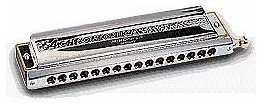I arrived back home after wandering the southern reaches of Illinois with Amanda, my 13-year old daughter. And one of the first things I did when I walked in the house was grab my Hering 64 chromatic harmonica, my Brazilian beauty with an antique gold finish. I have gone a week without playing, and it was wonderful to feel the weight of the instrument in my hands. The Hering 64 is a great harmonica, but cranky (like most chromatics). The "64" in the name refers to the number of individual reeds in the instrument. If there are any saxophone players reading this, imagine if you had to deal with 64 reeds on your instrument instead of one! So chromatics are tough to tune, and there are many opportunities for a note to go dead - one bad reed equals one dead note.
The chromatic harmonica was quite popular for about 20 or 30 years, from the 1920's through the 1950's. Remember the Harmonicats? They played technically challenging music, but it sounds pretty corny to most of us today (I still like it - the interplay of the chromatic with the chord and bass harmonicas can be engaging). The chromatic is a complete instrument with a unique voice, and the jazz world began to notice. There are a number of excellent jazz harmonica players (Howard Levy is perhaps the most incredible, since he plays crazed jazz on the little diatonic harmonica). But the inventor of the jazz chromatic is Toots Thieleman. He is 83 years old and still globe-trotting, playing concerts in Mexico, Germany and Turkey this month. He pushes an amazing amount of emotion throught the harmonica - passion combined with technical expertise.
But what grabbed me was blues on the chromatic. And the king of blues chromatic was, is, and always will be George "Harmonica" Smith. George passed in the early 1980's and it is one of my great regrets that I never saw him perform. He did not cut many records. But the work he left behind is a mother lode of inspiration for blues harmonica players. He was a powerful, raucous player with a great musical vocabulary. I am one of the many harmonica players who are George Smith wanabees, copping his licks and singing style. Yeah, the Walters (Little and Big) are great, Cotton and Junior Wells are important, but I REALLY FEEL George Smith.
Subscribe to:
Post Comments (Atom)



No comments:
Post a Comment